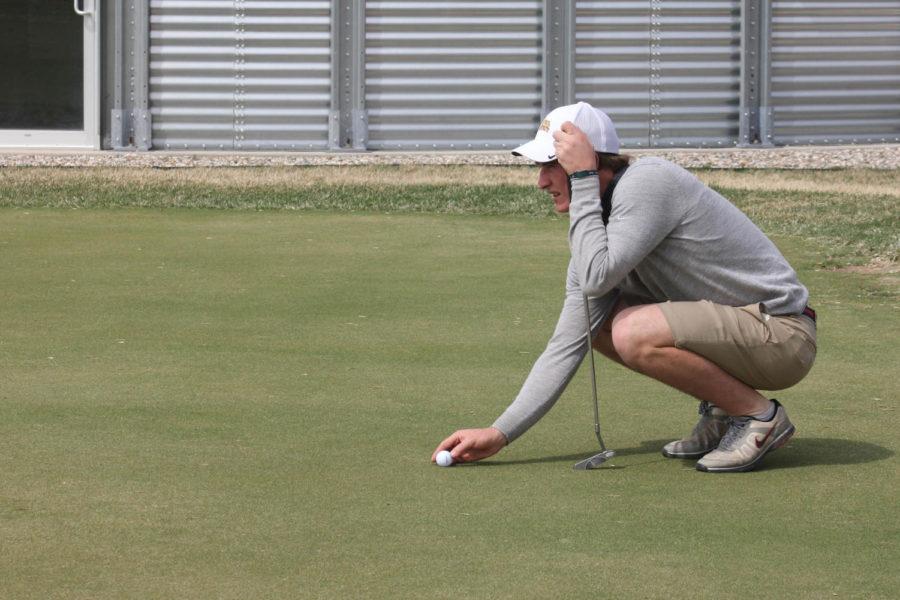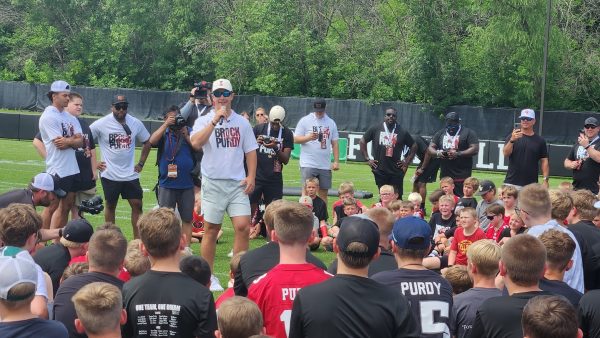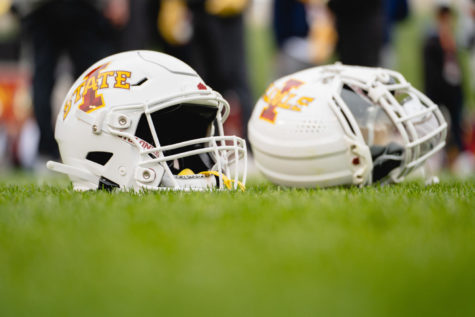Beyond the course: New Zealand native helps lead ISU golfers
Iowa State Daily/Korrie Bysted
Senior Duncan Croudis lines up his shot at practice April 21 at the Cyclone Golf Performance Center.
April 22, 2014
Just five years ago Duncan Croudis had not even heard of ISU golf, let alone the state of Iowa.
Growing up a world away in Dunedin, New Zealand, Croudis had a knack for golf, but a career playing against golf’s elite in America was not a lifelong dream.
After a relatively late start to competitive golf at the age of 15, he did not garner much attention from U.S. colleges. Instead, Croudis set his sights modestly, electing to play collegiately in his home country.
In just one season, Croudis caught fire in both the collegiate and amateur ranks, culminating in a victory at the New Zealand U19 championship. Playing in America was once an afterthought, but as colleges in the States quickly came calling, Croudis began to listen.
“I did a year of university back home. I didn’t give it a lot of thought [playing in the U.S.], to be honest,” Croudis said. “I won the New Zealand U19, then I played well in other events and that’s when I started getting emails from coaches, from schools.”
One of those coaches was then-first-year ISU coach Andrew Tank.
While at the University of Minnesota as an assistant coach, Tank had coached Thomas Campbell, another Dunedin native. Tank parlayed that connection, establishing a connection that resulted in landing one of New Zealand’s top young golfers.
Croudis joined current juniors Sam Daley and Scott Fernandez in becoming one of Iowa State’s most successful recruiting classes, a cornerstone trio in lifting Iowa State from the Big 12 cellar to a current top-50 ranking.
“He’s been a big part of this program becoming relevant on a national scale,” Tank said of Croudis. “He’s played in an NCAA Regional, played in a Big 12 Championship. He brings a lot of experience.”
In his first season as a sophomore, Croudis competed in 10 of 13 events, including a career-best 27th place finish at the Bridgestone Collegiate.
Forced into action early on as Tank worked to bring in new talent to Ames, Croudis was a contributor to an NCAA Regional qualifying team in his first year with the Cyclones.
“Looking back, playing in big tournaments and traveling to different courses, different places has been great,” Croudis said. “Just being with the guys, I have heaps of memories, for sure.”
As the program began to rise, the talent level on the team rose with it. Unfortunately for Croudis, spots in the lineup became tougher to come by.
“It’s tough, because you come here wanting to play,” Croudis said. “But I’ve been able to find other ways to contribute to the team and to be a leader and stay positive.”
Known as one of the more humorous members of the team, teammates, as well as Tank, showed admiration for Croudis’ work ethic and positivity.
Any inklings of regret or remorse from a lack of playing time were swept aside for the betterment of the team, particularly in fellow New Zealander Nick Voke.
“Having another Kiwi has been great,” said freshman Nick Voke, a native of Auckland, New Zealand. “Not just for what I’ve learned from him on the course, but having someone to relate to and to help me adjust to college life and life in Ames.”
Voke, along with fellow freshman Ruben Sondjaja have become full-time starters in their first years, joining Daley, Fernandez and redshirt sophomore Collin Foster. As a result, Croudis has become one of the odd men out.
In his junior and senior seasons combined, Croudis received only seven starts.
As a former college golfer himself, Tank acknowledged the trying situation a tough competitor like Croudis has faced, but admires Croudis’ role as a mentor and ambassador for the team.
In the classroom, Croudis earned Academic All-Big 12 honors in his junior and senior years. He will graduate in May, and plans to pursue a professional playing career in a minor league tour in Asia or Australia within a year or two.
Whether or not he makes it in the professional ranks, Tank has faith that Croudis will find success, regardless of what path he ends up taking.
“Golf is such a fragile game, some players don’t hit their peak until they’re 25, 30. If someone works hard, they can make it,” Tank said. “Either way, he’s going to walk out of here with a good business degree. Whatever he chooses, I think he’ll be successful.”

















